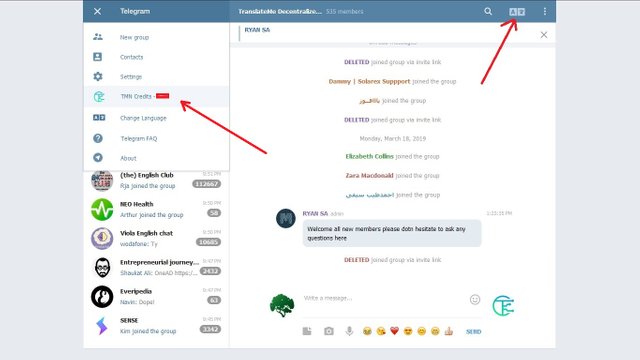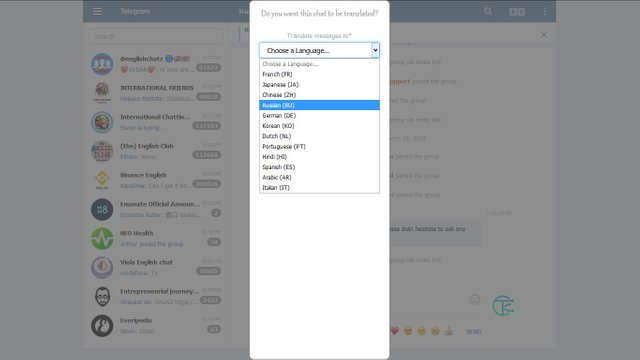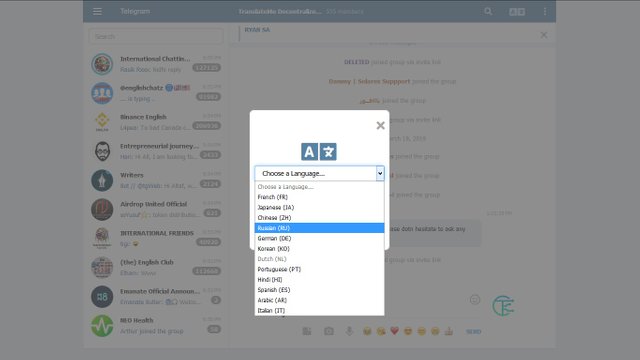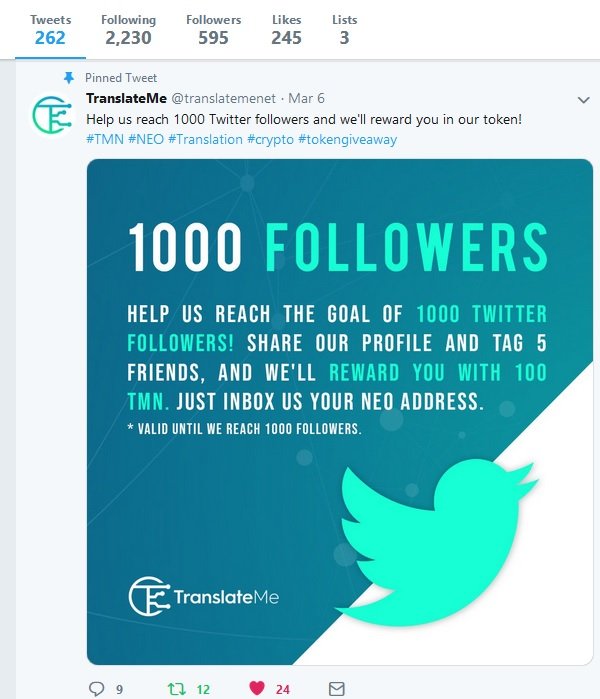TranslateMe (or Decentralization meets Translation industry). Part 1. TranslateMe Chat App. Help to preserve languages, break language barriers, earn TMN. Twitter campaign (100 TMN bonus)
Introduction
This is another post of the series devoted to TranslateMe project (all the links regarding it and little glossary of the terms used in this post will be given at the end of it).

pixabay
The purpose of the series is neither to destroy TranslateMe, nor to blindly promote it, but rather to provide/analyse some information on this topic. And it would be great to get some additional information/questions from Steemit users in the comments section.
If you’re new to this project, it’s highly recommended to acquaint yourself with an Introduction post (and Disclaimer given there).
In the previous post we’ve got the general overview of TranslateMe project and an understanding of why we need to somehow preserve the language diversity (“living things”).
In this post we’ll see what TranslateMe Chat App is, how it might help to preserve some languages, how you could be involved (and rewarded with TMN) in this project and what makes TranslateMe solutions (including that TranslateMe Chat App) different from tools provided by Google (Google Translate), Microsoft (Microsoft Translator) and DeepL (DeepL Translator).
As I said in the previous post, in the internet age web-resources/-tools also might help us with language preservation. They can help us to store (at least):
- sounds (for example, https://www.seeingspeech.ac.uk/ (“Seeing Speech”. MRI (Magnetic Resonance Imaging) and Ultrasound representation of speech) or https://www.internationalphoneticassociation.org/ (International Phonetic Association. They try to provide us phonemes of all languages)).
- words (their meaning) (for example, https://www.merriam-webster.com/ (Merriam-Webster dictionary) or https://www.macmillandictionary.com/ (Macmillan Dictionary)
- grammar rules (for example, https://learnenglish.britishcouncil.org/grammar, https://owl.purdue.edu/owl/purdue_owl.html (Online Writing Lab (OWL)) or https://www.grammarbook.com (GrammarBook))
And we have a huge amount of e-books (which you can find for example on http://en.booklid.org/categories (look into “Foreign Language” section))
Also there’re such resources like ReversoContext (https://context.reverso.net/translation/) and Linguee (https://www.linguee.com/) which provide us kind of corpora of bilingual texts (or segments in translation memory) in different language combinations among other features.
What makes TranslateMe solutions (including that TranslateMe Chat App) different from Google Translate, Microsoft Translator and DeepL Translator?
Based on the information found on Wikipedia and official web-sites of Google Translate, Microsoft Translator and DeepL Translator, all these web-tools
1
use artificial neural networks to generate translations;
provide their APIs as a paid service (Google Translate and DeepL Translator) or paid/free service (Microsoft Translator);
Also Google Translate and Microsoft Translator
2
give community an opportunity to provide their feedback (human touch) on the accuracy of machine-generated translations, thus improving their algorithms.
Google Translate, Microsoft Translator and DeepL Translator support (as of March, 2019):
3
103, 65 and 9 languages correspondingly.
TranslateMe Chat App currently (March, 2019) has an MVP (Minimum viable product) in the form of Telegram web-based Chat App (kind of prototype. Versions for IOS and ANDROID are scheduled to be released in March, 2019), which
support
12 languages including Italian (IT), Russian (RU), Chinese (ZH), Japanese (JA), French (FR), German (DE), Korean (KO), Dutch (NL), Portugese (PT), Hindi (HI), Spanish (ES), Arabic (AR)
and allows you to:
- get the messages written in any Telegram group translated into languages mentioned above;
- write your messages in any of the Telegram group in your native language (other than English) and get them translated into above-mentioned languages;
- provide your GPU for distributing computing (Note: the team are currently searching for miners. Contact them on Telegram if interested);
- correct existing machine-generated translations and submit your proposals of better variants, thus teaching that algorithm to make better translations (Note: you don’t need to be a translator. You just need to know at least one language);
- get rewarded with TMN for corrections/messaging (when the app is activated) and providing your GPU for distributing computing;
- train your skills (if you’re a translator);
- rate machine-generated translations;
There’re currently some ways to abuse that Telegram app (for the sake of getting more tokens). But the tokens won’t be provided to you immediately, and I do hope you understand that organizations like TranslateMe (which has created such a complex system already) have foreseen such kind of behaviour, and you won’t get any tokens by doing that after all.
It’ll be much more interesting to follow fair play principles.
Also you can help TranslateMe by buying their tokens listed on https://switcheo.exchange/markets/TMN_NEO
and being an end-user.
To get financial information (about token sales) visit https://translateme.network/ and talk with the team members on TranslateMe Telegram group (the link can be found on that official web-site).
The idea of the real-time chat translation is not new. Microsoft Translator has already sort of realized it.
For more information go to https://translator.microsoft.com/
So, what’s make TranslateMe solutions (including that TranslateMe Chat App) unique is that (at least):
1
you can get rewarded (with TMN) for your activities done there (messaging, corrections, ) (which is important in our current society (monetary society));
2
spectrum of the languages supported is supposed to be much wider;
With over 6500 languages to translate, we want to include every language in our venture and offer translations for even the most obscure of languages.
source
3
all advantages typical to blockchains (including high level of security, low-cost decentralized computing compared with traditional methods (up to 95% cheaper))
For more info on advantages of TranslateMe you can visit https://www.reddit.com/r/NEO/comments/axvr95/translateme_update_the_first_blockchainbased/
or their official web-site.
So, how to use that TranslateMe Chat App.
1
First of all, you’ll need to install the Telegram app itself on your device (which you can download on Telegram official web-site). It’s needed before signing up for that Telegram Chat App because a special code will be sent there.
2
Then visit https://translateme.network/ and go to that Chat app. While registering you’ll be asked to provide your phone number and NEO-address. If you search for “NEO scam” with Google you’ll find dozens of sad stories, so be careful. Visit NEO official web-site (find it on Wikipedia) and go to “Client” tab of the top menu. I recommend you “O3 wallet” (it’s also used by TranslateMe team), because “NEO Tracker” currently has some problems with showing TMN. “Neon wallet” for some reasons doesn’t show those tokens either.
3
As far as I remember, you’ll be redirected to TranslateMe Telegram group automatically.

4
All you need to do to use the app is to activate it by clicking the button (with two characters) on the top right corner next to search button. Choose your language, click “Yes”, and presto! Now you can rate machine-generated translations, edit translations… Note, that you can use it for free as for now in any group. It’s recommended not to use it in a lot of groups simultaneously (just 3-4 should be OK).

5
TMN amount can be seen, if you click that “hamburger button” on the top left. There you can change languages as well.

6
As I mentioned above TranslateMe currently support 12 languages: Italian (IT), Russian (RU), Chinese (ZH), Japanese (JA), French (FR), German (DE), Korean (KO), Dutch (NL), Portugese (PT), Hindi (HI), Spanish (ES), Arabic (AR).
By the way you can watch a demonstration on YouTube (TranslateMe - First Decentralized Translation Solution - Telegram App - With Ryan Lloyd; beginning from 13th minute)
I can say only about the accuracy of translations into Russian. Personally I was able to communicate with English-speaking world by using only Russian (the app was translating my messages from RU into EN and the messages in the groups from EN into Russian for me). The accuracy sometimes is very good, but of course in some cases is not at all. So, the app and the algorithm behind it definitely needs the human touch. It’d be great if you provide some kind of feedback about the accuracy in case of your native language if it’s listed there. By the way, Italian was added in 3 days. So, if you don’t see your language there, just ask the TranslateMe team to add it.
The trick with translations/corrections is that the same idea could be expressed with the help of different words or sentence structure. But you can’t (aren’t allowed) to submit several proposals for the same message. What you need to do is to provide the best variant just once.
Twitter campaign. 100 TMN bonus.
Well, I think this is the case when that “A picture is worth a thousand words” saying is to the point.

As of time of this writing there were 595 followers.
TMN will be sent into you NEO-wallet.
Experiment?
It would be actually very interesting to compare the accuracy of translations done by TranslateMe, Google Translate, Microsoft Translator and DeepL Translator, like it was done for the latter three translators. And repeat that kind of experiment after a while (when that TranslateMe become more powerful). Probably, if I figure out how exactly to do that, I’ll try and present results in this series of posts.
How exactly could that Chat App help to preserve some languages?
The problem with Google Translate (and other automatic on-line translators), Wikipedia and language preservation is that for example
Greek, Czech, Hungarian, and Swedish, with their 8 to 13 million speakers, have Google Translate support and robust Wikipedia presences, while languages the same size or larger, like Bhojpuri (51 million), Fula (24 million), Sylheti (11 million), Quechua (9 million), and Kirundi (9 million) languish in technological obscurity?
source
And TranslateMe is gonna try to change that
With over 6500 languages to translate, we want to include every language in our venture and offer translations for even the most obscure of languages.
source
Well, for that app to help to preserve languages, it must be used by people (which is obvious).
For those people to use it, they must at least have an Internet connection and be aware about the app.
There’re 7,111 languages on the Earth as for now. 840 of those languages are spoken in Papua New Guinea. At the same time only 0-9% of the country's population have access to the Internet (as for 2015; I didn’t find any newer data) (https://en.wikipedia.org/wiki/Global_Internet_usage).
I guess it’s possible that many of the speakers those 840 languages just don’t have Internet access, which means they won’t be able to use the app. The same situation should be in some other regions of the Earth.
Anyway, the point is that TranslateMe Chat App might help to preserve languages just like any other web-tool/resource (and again, the cool thing about TranslateMe Chat App is that the users get rewarded for their contributions).
Let’s hope the situation with that Internet access is gonna be improved in the future.
Taking into account that the app accuracy will be improved by humans, the app could be used as kind of educational tool to learn languages (especially for those languages which aren’t well supported by books, audio-/video records).
And even widespread languages books aren’t always the best choice. Sometimes people who taught language by books feel uncomfortable in the foreign country just because what those books give isn’t how native speakers really talk. Just like the knowledge of karate doesn’t guarantee that you won’t be beaten up by someone on the streets (dojos and streets are two very different things, you know).
And now, when you have a clear picture of how TranslateMe is gonna save the human race from extinction (well, at least I believe that TranslateMe could help to save some translators from extinction, because of that 1/5th of translator’s profits cutting by UpWork )):
I want to leave you with this final thought.
I've told you about how speakers of different languages think differently,
but of course, that's not about how people elsewhere think.
It's about how you think.
It's how the language that you speak shapes the way you think.
And that gives you the opportunity to ask, "Why do I think the way that I do?",
"How could I think differently?" and also "What thoughts do I wish to create?".
Lera Boroditsky
PS: If you’re gonna give that app a shot, please provide some feedback after a while to me (in the comments section for example). It really would be interesting to know how accurate that app is with different languages.
Posts of this series:
Glossary
MVP – Minimum viable product;
TMN – TranslateMe Token;
real-time –
a type of computer programming or data processing in which the information received is processed by the computer almost immediately;
[source - Collins Cobuild Advanced Learner’s English Dictionary. New Digital Edition 2008]
artificial neural networks –
computing systems inspired by the biological neural networks that constitute animal brains;
source
GPU – Graphics Processing Unit;
TranslateMe links:
Official web-site: https://translateme.network/
Twitter: https://twitter.com/translatemenet
Medium: https://medium.com/@translateme
Bitcointalk: https://bitcointalk.org/index.php?topic=5046399.0
Reddit: https://reddit.com/r/TranslateMe and https://www.reddit.com/r/NEO/comments/axvr95/translateme_update_the_first_blockchainbased/;
Telegram: https://t.me/joinchat/IH2fQBE5n5baIK2glyAAXQ
TranslateMe Telegram Application (MVP (minimum viable product), kind of prototype): http://telegram.translateme.chat